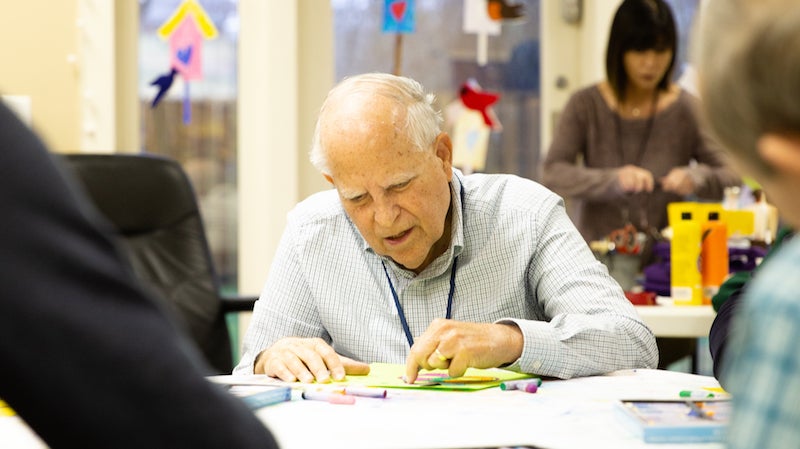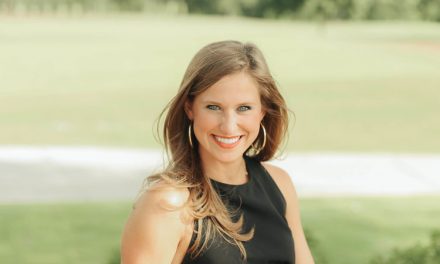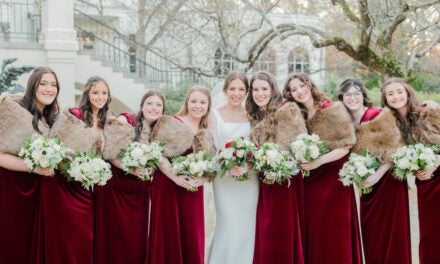Pat B. is filling in her Mardi Gras mask with a magenta pastel when we sit down to chat with her on a rainy Thursday morning. “I enjoy being here,” she says, looking to her friends sitting around the table with her who are also coloring and chatting. “I enjoy being together. That’s what’s most important to me—especially people who understand who I am.”
To feel the weight of Pat’s statement you need a little more context though. Pat has dementia, and like the others who come to the CARES (Caring for Adults through Respite, Enrichment & Socialization) program on weekdays, she can’t socialize with old friends like she used to. Often people with dementia can’t keep up with conversation and become self conscious about it. Companions fall away, and isolation and loneliness sets in. But not at CARES. Here, as Pat says, people understand her. They share her reality.
“We can move on from that moment where you can’t finish your story,” program director Pam Leonard says. “I think that’s what our people find in here—acceptance, love, feeling comfortable in this space. They then once again have some kind of social circle and community. We have real friendships in here. I have ladies you cannot separate; they are going to sit by each other all the time.”
And in this moment, Pat has her ladies. “My mantra these days is to live in the moment and whatever that moment is make the best of it,” she tells us.
Helene Taylor, an artist in residence UAB Arts & Medicine who spends time every Thursday with the CARES program, agrees that that today’s activity coloring and cutting out masks is not so much about the art itself. “It’s about the community that happens at the table,” she says. But at the same time it about the art too. “Research says that 45 minutes of creativity reduces your cortisol level,” Helene explains. “For this population there’s a lot of fear and confusion and that causes stress.” That’s where the art comes in.
Welcome to CARES
Looking around at the tables full of artists, you’ll see CARES volunteers and participants all wearing yellow name tags with no differentiator between the two, which is exactly the point. In fact, often new volunteers often don’t know who is who. Surrounding them in the formerly St. John’s Church for the Deaf across from St. Stephen’s Episcopal Church in Cahaba Heights are the artistic pieces they have collectively completed.
There’s a white canvas with all fingerprints of both CARES participants and young teens from N.E. Miles Jewish Day School that Helene whited out to form flowers. To its left, tin hearts hang on a tree, and behind it flowers all the participants colored are pasted on a tree that a participant had drawn from what he remembered from his childhood backyard. In the next room, there’s stained glass art in the window and a winter scene adjacent to it.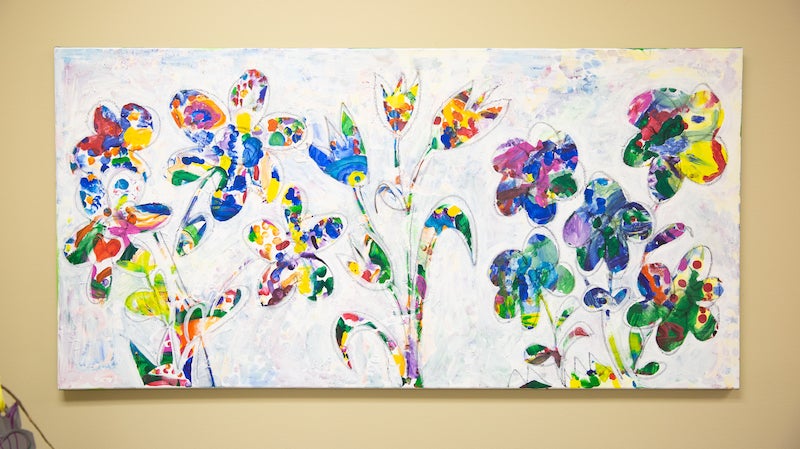
The participants often surprise those who work with them, too. When Helene first started with projects involving scissors she let the volunteers do that part of the project, but as it turns out the participants loved cutting—tapping an innate skill they have known for years. “The trick is to do something at a level that is not stressful but also not childish,” she explains. “That’s a tough balance.”
Another time she did a paper quilting project with a woman who had loved to quilt. Her precision of cuts and putting it together tapped into her previous memories, and then she glued the finished product it to the table. “It’s so interesting,” Helen notes. Still another man she works with can draw a house with a picket fence but he can’t speak to her. “It can be sad but it’s also just the truth,” Helen says.
Throughout the program, eight to ten volunteers come each day, Monday to Thursday, help put chips on bingo cards or put paintbrushes in water, whatever is needed. More than anything they want to show respect and dignity to those who are there—ultimately just fostering friendships. The volunteers we talked to say makes them feel good just to be able to help a friend and all in all is rewarding. “You can see some of the stimulation some of the people show,” volunteer Alan Davis says. “It’s gratifying if you see a smile on their face.”
Together they play games and trivia that have been adapted. They dance. They paint. They participate in an exercise class. And each day ends with singing. “It’s great for this population because even if they can’t communicate in the way they have historically communicated they can sing along to words they know,” Pam says.
Every day starts with trivia on topics brains tend to hold onto like common sayings or song lyrics, and boy does getting it right build confidence. Pam tells the story of a former NASA scientist in the program. “When he answers the trivia and gets it right, he has a big smile on his face because it makes him feel very smart,” she says.
Each activity lasts 15-20 minutes, just long enough to keep the participants’ attention, combining for a jam-packed four hours. “As long as they are being stimulated and they are enjoying what they are doing they are distracted from being concerned with where their loved one is or trying to make sense of what is hard to make sense of,” Pam explains. “All the activities are broken down in ways they can feel successful.”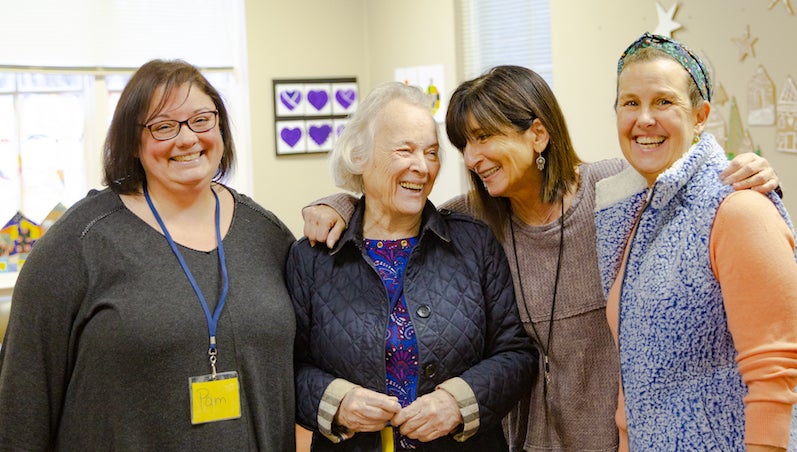
All involved also know how important this respite time is to the participants’ caregivers, for them to know their loved one is being safely cared for and being active. “We are exhausted (after four hours), so I can only imagine another 20 hours,” volunteer David Reese says. “They seem to like it, and we all like it.” The time participants spend at CARES free up the caregivers to tend to their own medical appointments or even just take a nap, and participants can come just one day a week or more, depending on the needs of their family.
Volunteer Phil Teninbaum knows firsthand how vital that is. “My mother had dementia and it never leaves your mind. My brother and sister used to come into town and I felt like I had two days off,” he says. “It never leaves the caregivers’ mind.”
Pam herself has a similar understanding since she had two grandparents with dementia, and for a season she would stay with her grandmother one night a week. “It was very challenging, and I think of caregivers who do it seven nights a week,” she says.
A Shared Experience
CARES’s umbrella organization, Collat Jewish Family Services, has served seniors in the Birmingham community for the past 30 years with counseling, food assistance, personal care and other services. Even those the word “Jewish” is in its name, CJFS is not a religiously based nonprofit but rather serves people of all faiths. And with that backbone, CARES can provide its participants and caregivers more counseling, case managers or other services when needed.
And it was CJFS that first recognized a need for a program like CARES in Birmingham. Five years ago there wasn’t a respite ministry in Birmingham for caregivers of adults with dementia to give them a break from caring for their spouse or parent, so Pam and her team travelled to Montgomery to see one that was in action there and modeled CARES after it. Today there are three other similar programs in the Birmingham area and more in the works who are looking to CARES as a model.
In keeping with what they learned, CARES also offers a caregivers’ support group on the third Thursday of the month at 1 p.m. that is open to anyone in the community, not just CARES participants’ families. ”What we find in that time is people need to hear from others who are going through what they are going through and sharing that experience,” Pam says. “Our caregivers are a wealth of knowledge. They are living it, so they can help each other.”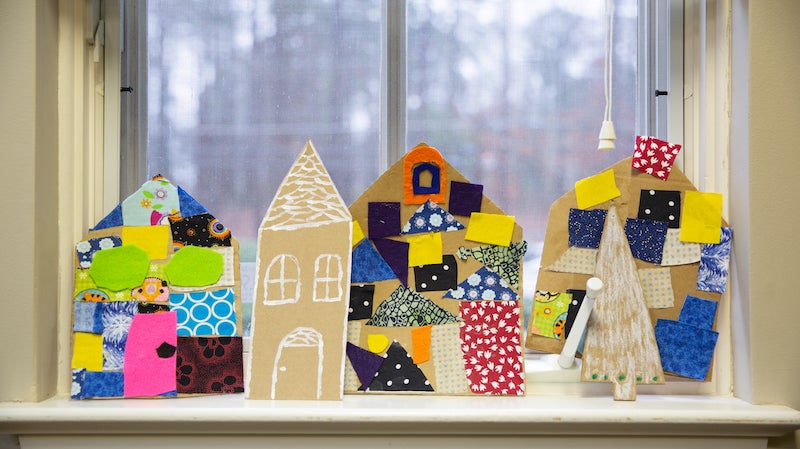
There’s a special treat to the nature of CARES for the participants to be apart from caregivers too. At home they might be told that they have to eat dinner or get ready to leave. But here, if they want to participate, great, and if not that’s fine too. A volunteer will come over and make connections in a different way if that’s the case.
And Pam, CARES Assistant Director Lise Grace and the volunteers learn from the participants too. “I ask them for parenting advice, and they all weigh in,” she says. “This population still has so much to give and they want to give if we can slow down enough to listen and respect the fact that they have something to offer.”
And Pam can’t see herself anywhere else. “I get to see the good in people,” she says. “It’s the opposite of the world out there. In here there is no mistake for anybody. We are just trying to do the best we can and be kind to each other.”
But it’s hard too, especially as she watches dementia progress and folks lose more and more communication. It looks different for everyone, but often they have a thought but can’t communicate it and they lose connections with those they love. But at other times during CARES something clicks for someone and they, on that occasion, communicate their point.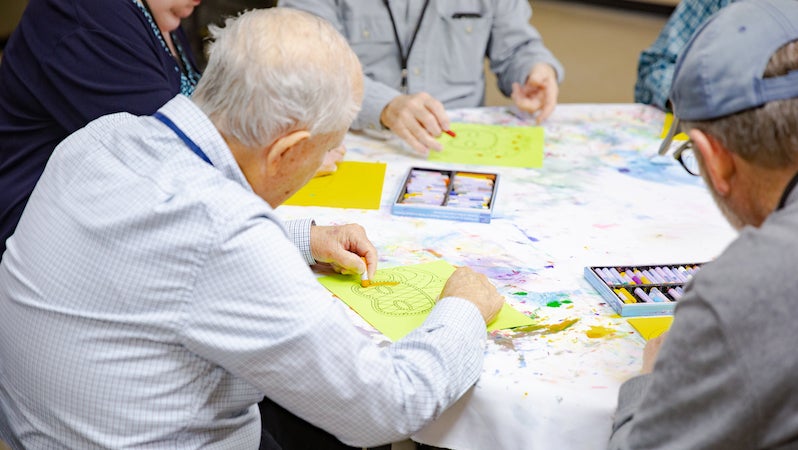
Lise first became familiar with dementia when her husband was diagnosed with Alzheimer’s in 2011, and she’d eventually shift from working as an attorney to working for CJFS. “Now I have the best job I have ever had,” she says. “It’s so fulfilling to at the end of the day know you have made someone’s life a little easier.”
When her husband was living she both brought skills she learned from him to CARES and even more so learned things at CARES she brought home with her. Perhaps the biggest she learned on her own journey was that they may not remember who you are but they remember how you made them feel.
And indeed at CARES folks know that this is a happy place. Here they don’t have to explain themselves, and that is beyond freeing. And that’s just why Pat and her friends love to be there.
How to Befriend Someone with Dementia
Here’s a crash course on volunteers are trained to approach their CARES friends.
Instead of bringing participants to reality, volunteers try to meet them where they are. So if a participant says he or she is waiting for her parents, who the leaders know are no longer living, to pick them up, they don’t correct them. Instead, they assure them they are safe and will be picked up. Likewise, they don’t ask specific questions like how many children they have that they might not be able to answer.
“You don’t contradict or argue or disagree,” Lise Grace says. “You tell them you are sorry even if you didn’t do anything wrong. It’s so liberating to know it’s not going to do you any good (to correct them), it’s going to escalate the situation. If someone talks about their mother who has been long gone, you say, ‘Oh I bet you are looking forward to seeing her tonight!’”
Another pointer: volunteers and leaders aren’t there to do things that participants can do themselves. Volunteers help when needed but try to let them do whatever they can for themselves.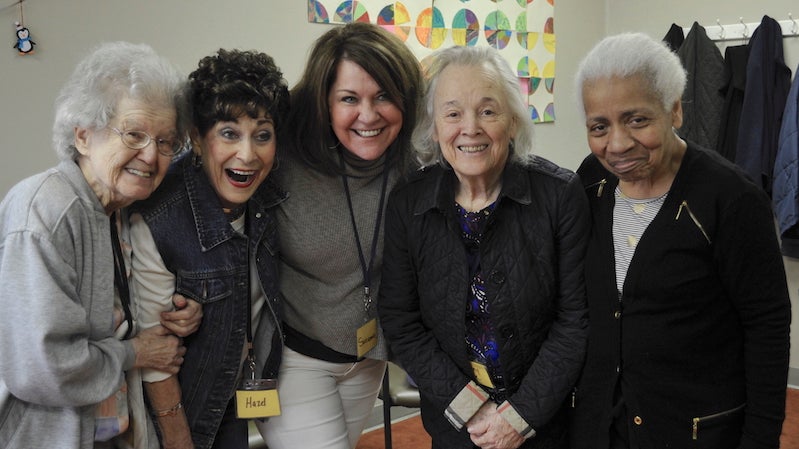
More Respite Ministries for Adults with Dementia
Founders Place
St. Luke’s Episcopal Church
Contact Executive Director Susanna Whitsett at swhitsett@saint-lukes.com or visit saint-lukes.com/founders-place1.
Encore
Canterbury United Methodist Church
Visit encorerespite.org or call the Encore office at 205-874-1525.
Anchor Community Respite Ministry
Asbury United Methodist Church
Visit asburyonline.org/anchor/ or contact Program Director Gina McIntyre at 205-529-6353.

